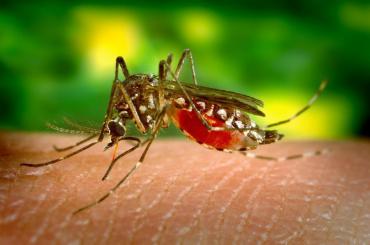Fight the Bite: Take Steps to Prevent West Nile Virus
With the arrival of spring weather and some recent rainfall, it is time to be aware of the importance of preventing mosquito bites that can transmit West Nile Virus (WNV). Though mosquitoes are just starting to fly in our community, dumping standing water from the rainfalls this week will reduce their breeding areas, ultimately helping to reduce the possibility of being bitten.
“Mosquitoes lay their eggs in standing water in our yards. It’s important to empty and scrub, turn over, cover, or throw out containers that hold water around our homes to minimize mosquito populations. These would be things like flower pots, gutters, buckets, pool covers, pet water dishes, tires, birdbaths, rain barrels and trash cans,” says John Hausbeck, Environmental Health Supervisor for Public Health Madison & Dane County (PHMDC).
PHMDC plays a role in mosquito control efforts by monitoring for mosquitoes that transmit West Nile Virus and working to control them. The public are also essential in helping to identify and report sick or dead crows and blue jays, as they are an indicator of West Nile Virus in the community, which could infect humans.
West Nile Virus is transmitted to birds and people through bites from mosquitoes infected with the virus, with about 1 in 150 infected people developing a serious and sometimes fatal illness as a result. “As a way of gauging the likelihood of WNV infecting humans in a given year, we collect information from the public on dead crows and blue jays. If anyone finds a sick or dead crow or blue jay, we ask that they call 1-800-433-1610 to report the bird,” says Hausbeck.
Individuals can reduce their risk of being bitten by mosquitoes and getting infected with the West Nile Virus by protecting themselves against mosquito bites.
In order to prevent mosquito bites:
- Wear long-sleeved shirts and long pants from dusk through dawn. That’s when many mosquitoes are most active.
- Install or repair screens on windows and doors to keep mosquitoes outside.
- Use EPA-registered insect repellents, following product instructions.
- Treat clothing and gear with permethrin or purchase permethrin-treated items.
Contacts
- Sarah Mattes, (608) 216-3202, smattes@publichealthmdc.com
